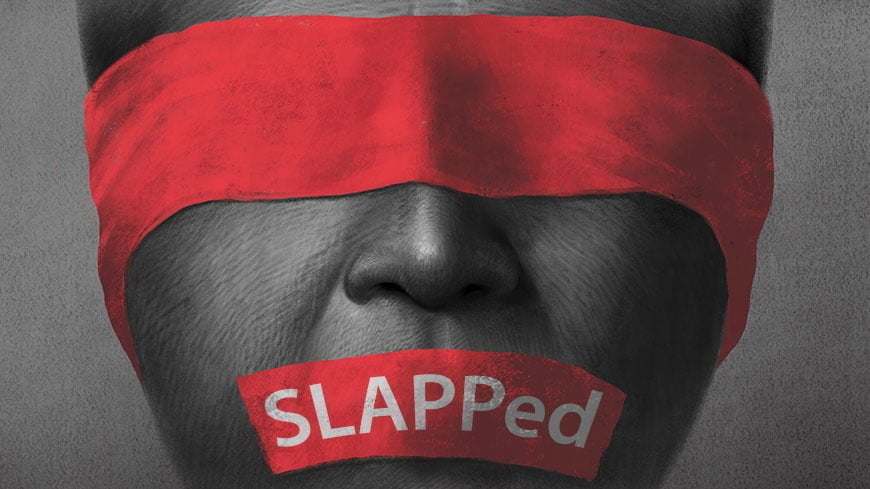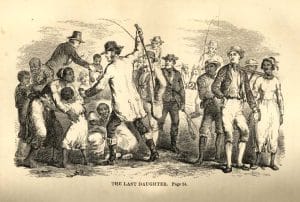Read Part 1: Defamation Lawsuits Can Be Weaponized Tools Of Censorship
Jim Worthington is a self-described “well-known and highly regarded businessman,” while Clarice Schillinger is on the current Republican primary ballot seeking to be the Commonwealth’s next Lieutenant Governor. The Law Office of Geoffrey R. Johnson in Jenkintown is representing Worthington and Schillinger in each of these lawsuits.
The first Worthington lawsuit targets an ordinary citizen – Gregory Bullough – who circulated a petition using MoveOn.org’s website urging citizens to “End Partnership with Newtown Athletic Club,” a health club owned by Worthington. Worthington is also suing the progressive political advocacy group and political action committee MoveOn. Bullough was apparently outraged that Worthington, who helped form the political advocacy group “People4Trump,” had organized and sponsored three buses to send 200 Trump supporters from the Philadelphia area to Washington D.C. on January 6, 2021. In promoting the event, People4Trump’s website specifically stated that the bus trip was going to Washington, DC for the “Million MAGA March,” further stating that the “March will start at the National Mall and proceed to the Capitol for the Electoral Votes.” Bullough turned his outrage into a petition directed at Worthington and his gym. The petition that was circulated online stated that: “Newtown Athletic Club in PA’s owner sponsored and organized three bus-loads of people to participate in what became the January 6th shameful riot and insurgency.”
Worthington sued both Bullough and MoveOn claiming that he was defamed by the petition because it falsely accused him of “sponsoring and organizing a group to engage in criminal conduct at the U.S. Capitol.”
Notably, in the first version of his complaint, Worthington alleged “upon information and belief” that none of the people he transported converged on the Capitol.
In the amended version, as highlighted by MoveOn in its court filing, Worthington omits that allegation.
The suit also includes the Newtown Athletic Club as a plaintiff, claiming that the business lost some of its “community partners” because of Bullough’s petition.
The first Worthington lawsuit remains pending in the Bucks County Court of Common Pleas, where a judge recently denied the first attempt by Bullough and MoveOn to dismiss the case.
Worthington’s second lawsuit, also pending in Bucks County, targets Ashley Ehasz, the presumptive Democratic nominee for Pennsylvania’s first congressional district, currently held by Representative Brian Fitzpatrick. Worthington is a significant supporter and close friend of Fitzpatrick. Worthington’s lawsuit claims that Ehasz accused him of funding, aiding, assisting, inciting, or conspiring with others to commit the crime of insurrection, a felony under federal law.
Specifically, at a Newtown Township Zoning Hearing Board, Ehasz voiced her opposition to Worthington’s application for a zoning variance which would have permitted him to host a gun show on one of his properties. Ehasz is alleged to have said that “Worthington spent thousands of dollars to bus 200 people to attend the January 6th rally in Washington, DC – the FBI even showed up at his house where he bragged on the radio that his girlfriend grabbed a gun before talking to the FBI.” Ehasz further allegedly said that Worthington’s “flippant and dangerous support of the lies about the election, lies which endangered law enforcement, show he cannot be trusted to host an event with deadly weapons in our community.” Worthington also cites as defamatory the following alleged statement sent to potential donors to Ehasz’s political campaign: “Jim Worthington – owner of the Newtown Athletic Club and major donor to Rep. Brian Fitzpatrick – spent thousands of dollars and organized busloads of Trump supporters to attend the ‘Stop the Steal’ rally that turned into a violent insurrection at the U.S. Capitol on January 6, 2021.”
Worthington’s claims rely on subtle distinctions of fact and nuanced use of language. Worthington must concede as true the fact that his People4Trump organization promoted, encouraged, funded, and transported people to Washington, D.C. on January 6, 2021 for the “Million MAGA March” – which was scheduled to converge on the U.S. Capitol. Yet Worthington characterizes as defamatory any statement or insinuation he had anything to do with the participants in the Million MAGA March who violently stormed the U.S. Capitol in an attempt to prevent the peaceful transition of power. Worthington tries to draw this distinction despite being unable or unwilling to attest to the fact that none of the people he helped transport to D.C. participated in the violent insurrection or trespassed into the U.S. Capitol.
For her part, Ehasz, who is represented by Daniel L. Ceisler of Saltz Mongeluzzi & Bendesky, and Helen A. Lawless of Kline Specter, filed a meticulously researched and detailed answer to Worthington’s complaint, including over 100 pages of exhibits, some from social media posts that have since been removed. The answer appears to be setting the stage for a vigorous defense based on the First Amendment standard articulated above. Worthington’s lawyer has asked the court to strike some of Ehasz’s answer as “scandalous or impertinent” under the applicable rules of civil procedure.
Schillinger’s lawsuit targets PA Spotlight, which describes itself as an “accountability and investigative organization … exposing billionaire-funded anti-union efforts and front groups across the Keystone State.” The suit is also brought on behalf of Schillinger’s Keeping Kids in School PAC (KKIS). Schillinger’s central claim is that an article in PA Spotlight defamed her and disparaged KKIS by characterizing her PAC as a “dark money organization … falsely implying that Schillinger was complicit in an enterprise to channel dark money for nefarious purposes.” The suit also names Eric C. Rosso, the Executive Director of PA Spotlight, and a “John Doe” defendant – to be substituted by the article’s author, if and when that identity is revealed.
Specifically, Schillinger alleges that she and her PAC were harmed by the words that accused KKIS of being a “dark money organization.” The term “dark money” refers to the “market for people who want to influence elections without identifying themselves.” Schillinger further alleges that PA Spotlight’s characterization of KKIS as one of the “front groups masking the work of billionaire donors and extremist politicians” is also false and defamatory. Notably, one of KKIS’ largest contributors is identified as the political action committee Back to School PA. That PAC’s donors include billionaire Paul J. Martino, and the “Commonwealth Children’s Choice Fund” and “the Students First PAC” – two other PACs whose largest donor is billionaire Jeffrey Yass, but are also funded by billionaire Dick Uihlien.
Schillinger also takes issue with statements that KKIS recruited “QAnon conspiracy theorists for office,” allegedly made by PA Spotlight on its Twitter account. Schillinger alleges that KKIS endorsed 80 candidates in a bipartisan fashion, presumably endorsing candidates who would vow to keep schools open, regardless of any federal, state or local mandates. KKIS cannot deny that it endorsed several QAnon-affiliated or QAnon-sympathetic candidates. Specifically, KKIS endorsed Ricki Norley Chaikin for the Pennridge School Board, Ada Nestor for the West Chester Area School District, and Cora Landis for the Palisades School District, each of whom have, at the very least, shared QAnon content through their social media accounts.
Like Worthington’s two lawsuits, Schillinger is asking the court to draw subtle, extremely nuanced distinctions to find that she could have been harmed by words whose sting may be less damaging than the truth.
In evaluating the merits of these cases, the courts will likely consider some of the following questions: Did Worthington’s gym lose its “community partners” because of the publication – or because those community partners became aware of Worthington’s broader political affiliations through his outspoken advocacy? Was Schillinger’s reputation damaged because of the association with “dark money,” or because her organization received funds filtered from billionaires? Did Worthington suffer a blow to his reputation because of Ehasz’s words, or because he sent three busloads of people to the “Million MAGA March” on the U.S. Capitol on January 6, 2021? Was Schillinger harmed because of the PA Spotlight article or because KKIS endorsed at least three QAnon candidates and tried to put them in charge of public schools?
When you have prominent voices on the right – including members of Congress – repeatedly accusing their political adversaries of being “satanists”, “child molesters” and “pedophiles,” the words at the heart of the Worthington and Schillinger defamation claims, especially when viewed in conjunction with readily ascertainable facts, seem almost quaint and genteel in relation.
In the broader context of today’s bare-knuckle political arena, the alleged defamatory content directed at both Worthington and Schillinger appears to be mild and easily forgettable. Odds are that these publications would have long been forgotten had they not been memorialized in these lawsuits.
This is the third dirty secret of First Amendment litigation: filing a lawsuit brings additional attention to the alleged defamatory content. It is a curious phenomenon, especially when you consider that many defamation litigants leak the news of their own filed lawsuits to the press. Drawing more attention to the words you allege damaged your reputation is a strange way of redressing that damage. It is, however, an effective way of making your critics think twice about directing their publications against you in the future.
The motives behind the Worthington and Schillinger lawsuits are beyond the scope of this article, as is the question of whether these specific lawsuits are an abuse of our judicial system. Unlike most defendants facing these claims, all sides in these three lawsuits seem adequately represented. I expect the courts handling these cases will eventually rule in accordance with the mandates of the First Amendment, Pennsylvania’s common law, and all applicable precedent.
Whether or not these lawsuits are eventually found to be meritorious or abuses of the legal process, Pennsylvania has a critical need for reforms adopted by at least 30 other states to mitigate against what are more commonly known as Strategic Lawsuits Against Public Participation (SLAPPs).
Sunday, we will discuss how to protect the free speech rights of all Pennsylvanians, not just the ones who can afford seven figure legal bills.






